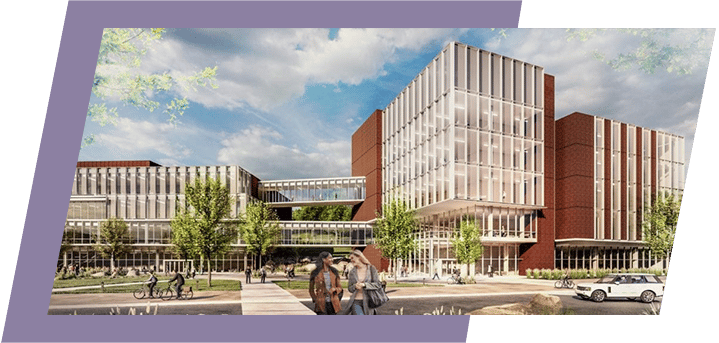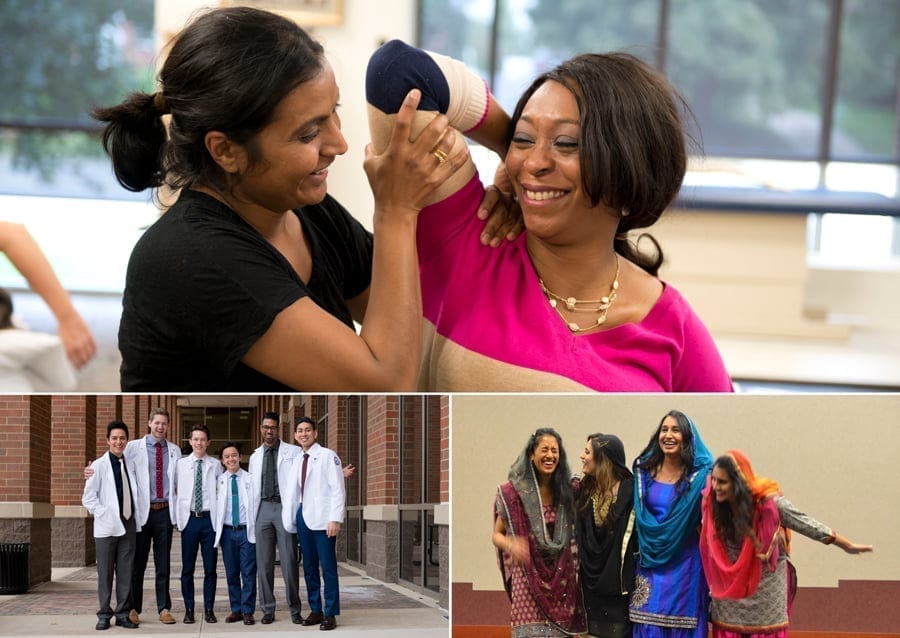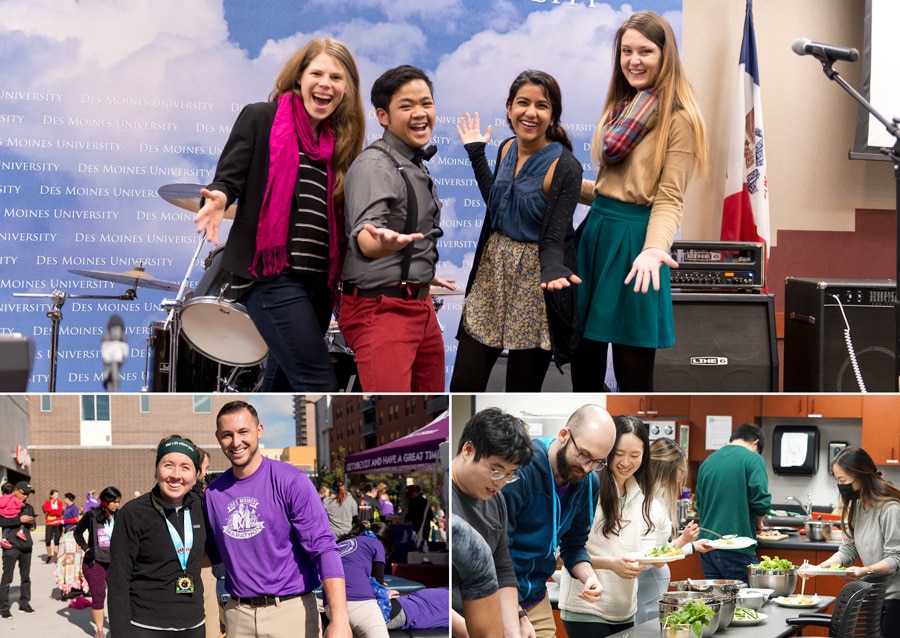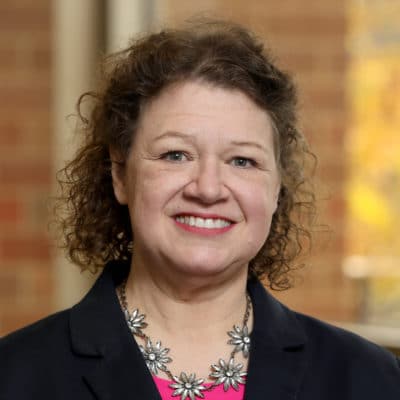Comprehensive education for comprehensive care
Train To Treat the Body as a Whole With DMU’s D.O. Program
For more than 120 years, doctors of osteopathic medicine have targeted their care and research on the body in its entirety, not simply by its individual injuries, symptoms or issues.
This comprehensive, whole-body approach to medicine requires advanced training, education and unique expertise—and it takes a compassionate and driven person to master the skills it requires.
From primary to specialty care, the United States could see an estimated shortage of up to 124,000 physicians by 2034, according to the Association of American Medical Colleges. Study and train now for an osteopathic medical degree that prepares you for a successful career in medicine and helps meet this growing need.
The doctor of osteopathic medicine degree program at Des Moines University helps you develop the clinical, interprofessional and communication skills required to work with colleagues in delivering the best quality care for your patients—from head to toe.
Featuring a challenging curriculum, expert instructors and cutting-edge facilities, our doctoral degree in osteopathic medicine will help you secure your future. You will be prepared for your residency, the national board exam, advanced education and your career. In 2023, DMU osteopathic medicine students achieved the highest board exam pass rate in the nation.

The Future of Health Care Education is Here
Welcome to the new home of Des Moines University.
Quick facts:
Quick
facts
100%
residency placement rate for D.O. degree students
4
years to complete DMU’s doctor of osteopathic medicine degree
97.7%
the Class of 2022’s pass rate for the Level 1 COMLEX licensure exam
1898
the year our D.O. degree program was founded
Doctor of Osteopathic Medicine Degree Program Highlights
Des Moines University offers you tremendous advantages in medical school. While studying for your osteopathic medical degree here, you will:
-
Join or Lead Groundbreaking, Career-Defining Graduate Research
Want to dive a little—or a lot—deeper into a specialty area while on the way to your osteopathic medical degree? Get involved with a graduate research project between your first and second years. DMU graduate students who have participated in research programs have had their articles published in peer-reviewed journals, traveled to meetings across the country to present their research and won prestigious national awards, fellowships and scholarships.
-
Train and Practice in State-of-the-Art Labs
While studying for your osteopathic medicine degree at DMU, you will learn in a variety of labs and other settings with cutting-edge technology and tools, including the Cadaver Dissection/Anatomy Labs, the Surgical and Medical Skills Lab and others.
-
Collaborate With Fellow Medical Students
At DMU, our college environment might be small, but the camaraderie and community you’ll find among your peers are big. Get to know your fellow students and develop valuable teamwork skills.
-
Receive Support and Guidance When You Need It
Throughout our four-year D.O. program, we will be here to support you from start to finish, especially through the residency application process in your third and fourth years. Our faculty members are committed to training and educating you to become a well-rounded, highly skilled health care professional.
What can you do with a doctor of osteopathic medicine degree?
With myriad specialties and a variety of fields for advanced education, career opportunities abound with an osteopathic medical degree from DMU.
Doctor of Osteopathic Medicine Careers
Our D.O. graduates have gone on to become:
- Physicians, including family practitioners, pediatricians, sports medicine doctors, obstetricians/gynecologists and surgeons
- Clinic, hospital or department heads
- Clinical and scientific researchers
- Professors or other educators in academia
Meet Your Osteopathic Medical Degree Program Faculty
Our faculty members in the College of Osteopathic Medicine are osteopaths, medical doctors, scholars and researchers, community physicians and more. In addition to their accessibility and availability through an open-door policy, you will be assigned a faculty advisor who can guide you through med school and prepare you for the next step in your career.
What doctor of osteopathic medicine students are saying
“For me, osteopathic medicine has always been the only choice. Growing up in Des Moines, I was exposed to manual medicine and osteopathy from a young age. After seeing the utility in personal experiences with my family, I knew once I started down the path of becoming a physician, I would want to be an osteopathic physician. The perspective of the body as a unit with self-healing characteristics allows for a more patient focused approach, rather than a pathology focused approach, in my opinion.”
Benjamin Hurley, D.O.'23
Explore Doctor of Osteopathic Medicine Degree Program Courses
DMU’s osteopathic medical degree program combines challenging coursework with cutting-edge, hands-on learning opportunities through lab work and simulations.
While studying for your osteopathic medicine degree, your four years at DMU will be divided into pre-clinical and clinical phases. The first year will focus on fundamental scientific principles, and the second year will build on that knowledge with an integrated organ system approach that encompasses basic and clinical sciences.
In your third and fourth years, you will be fully immersed in clinical training with rotations in a variety of settings.
You will also benefit from medical practice with real-life and realistic scenarios:
- Dissect the human body from head to toe in the cadaver and anatomy lab.
- Record and interpret EKGs on fellow medical students.
- Learn and perfect your communication skills through patient encounters with actors to hone your bedside manner and physical examination skills.
- Provide care while working on a health care team with high-fidelity, mannequin-based simulations.
- Experience everything from gloving and gowning to draining abscesses in a realistic operating room.
Other Related Opportunities and Courses of Study
While you are completing DMU’s osteopathic medicine degree program, you may also choose to participate in learning experiences outside the classroom and lab. For instance, DMU’s Global Health Program offers leadership and learning opportunities through service trips, research internships and clinical rotations at sites around the world.
If you would like to continue your graduate education beyond DMU’s osteopathic medicine degree program, we also offer a one-year fellowship in osteopathic manual medicine.
Graduate Degree Programs Related to Doctor of Osteopathic Medicine Degree
Diversity at DMU: Your culture creates ours
Cultural competency is part of the personal and professional development that happens at DMU. Our campus environment is shaped by individuals who bring cultural differences, life experiences and distinct characteristics.


Welcome to campus: See for yourself what we're all about
DMU offers opportunities to get involved in experiences outside the classroom. We are committed to providing a safe and inclusive environment for all our students.
Living in Greater Des Moines: Your new favorite place
Besides being a great place to live and work, the greater Des Moines metro is a vibrant area with communities from all walks of life. Ethnic grocery stores, restaurants and year-round events ensure that there’s always something for everyone.































































